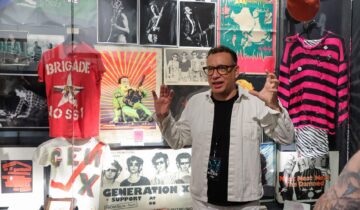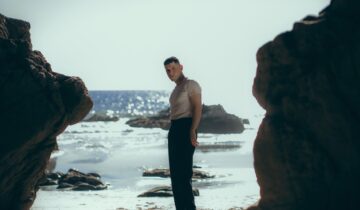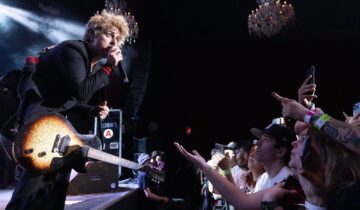 For SF WEEKLY: Souls of Mischief‘s early ’90s hip-hop work drew comparisons to the laid-back, jazzy vibe of A Tribe Called Quest and other members of the Native Tongues collective back East, but their sounds and words were wholly rooted in their hometown: East Oakland. They came to be part of the like-minded Bay Area Hieroglyphics crew (Del the Funky Homosapien) and an entire West Coast roster of groups with similar aesthetic ambitions (Freestyle Fellowship, Pharcyde).
For SF WEEKLY: Souls of Mischief‘s early ’90s hip-hop work drew comparisons to the laid-back, jazzy vibe of A Tribe Called Quest and other members of the Native Tongues collective back East, but their sounds and words were wholly rooted in their hometown: East Oakland. They came to be part of the like-minded Bay Area Hieroglyphics crew (Del the Funky Homosapien) and an entire West Coast roster of groups with similar aesthetic ambitions (Freestyle Fellowship, Pharcyde).
Last year, the group celebrated the 20th anniversary of its debut studio album ’93 Til Infinity, which never climbed above No. 85 on the Billboard Hot 100, but the band’s influence managed to stretch further anyway. Several influential skateboarding videos featured its music, which band members say catapulted the group to the vast board-culture audience. Souls of Mischief songs have also been played at Golden State Warriors games. Artists and producers like Big Sean, Big K.R.I.T., Vampire Weekend, and P-Diddy have sampled the group’s music or incorporated it into their sound.
This year, Souls of Mischief revisits the ’90s with new source material. Oakland takes center stage again in the group’s latest release, There is Only Now, a concept album based on a 1994 incident in which a guy in a ski mask approached band members as they were hanging out outside of an Oakland club, told everybody to get down, and a shot went off. None of them were hurt, but the event stuck with them.
Producer Adrian Younge (Adrian Younge Presents the Delfonics, Jay-Z, Ghostface Killah) recorded the group using all analog equipment — no Pro-Tools, no computers. “When the change to digital happened, everyone moved with it, but we forgot how it feels to hear analog sounds,” says Tajai Massey, one of the group’s four rappers. “But it’s the whole recording process. You can’t capture that same feeling on computers, but you know it feels different. It’s like if you bake something versus throwing it in the microwave.”
Snoop Dogg, Busta Rhymes, and Ali Shaheed Muhammed make guest appearances. With Younge at the helm, songs often sound like the Dap Kings stepped in as the backing band. The album has been likened to a blaxploitation film, but rapper Opio Lindsey says it’s more like the 1979 movie The Warriors. “It’s kind of over the top, and deals with love and friendship and trust, but it’s like an amazing soundtrack for a fast-paced action movie, like a Grindhouse film.”
For anyone who listened to hip-hop in the ’90s, this album will resonate. It’s got laid-back tempos and laid-back vocal delivery, with strong ties to funk, soul, R&B, and jazz. “Womack’s Lament,” featuring Busta Rhymes, sounds like a distant cousin of A Tribe Called Quest’s “What’s The Scenario.” But combined with the analog production, the album is not a rehash of the past: It sounds authentic, timeless, and specific. Souls of Mischief have made music together for more than a decade; this album feels like a document of the band’s experience, familiarity, and confidence.
The members of Souls of Mischief, who formed the band while they were in high school, were into Too Short as much as Run DMC when starting out. They listened to Brand Nubian, EPMD, and Nice & Smooth. “We were like a sponge for hip-hop,” Lindsey says. “We liked people that sounded original, like Big Daddy Kane and Rakim, guys who always said not to bite styles. That was the move we tried to make.” The group has aimed to apply that modus operandi to five studio albums as Souls of Mischief and three studio albums with the Hieroglyphics.
The band’s well-known single, 93 Til Infinity, is available on iTunes on a compilation, but the entire album is not (it is still available on CD and vinyl). Sample-heavy hip-hop groups like De La Soul have struggled to get their music on iTunes, but members of the group say theirs is not a sample clearance issue. “[The single] is the song they can really make money off of, so why would they want to pay royalties on the rest of it?” Massey says. “The whole industry is set up by gangsters to make gangsters money. It’s not surprising to me at all.”
Massey and Lindsey say the group did not set out to make a grand statement about violence in Oakland, but the allegorical nature of the album is timely. Oakland was named robbery capital of America last year, the city has one of the highest murder rates in the country, and internal issues persist with the Oakland Police Department. At one point in the album, narrator Ali Shaheed Muhammed asks if Oakland needs a superhero to help right the city’s wrongs.
“We’re not walking around saying we are from big bad Oakland. People condemn the violence, they make it too much of a topic, but it’s part of living here,” Massey says. “It’s not a constant daily thing for us in the band, thankfully, but for some people here, it is. And dealing with violence is traumatic.”
Image courtesy of Souls of Mischief




[…] the gods finding his only solace in bloody battle. Over the years he warmed to the company of six similar souls, their only bond being their love of fighting and presence of death. These men and woman never […]